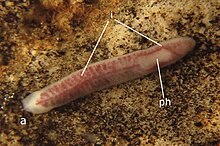| Cavernicola | |
|---|---|

| |
| Hausera hauseri | |
| Scientific classification | |
| Domain: | Eukaryota |
| Kingdom: | Animalia |
| Phylum: | Platyhelminthes |
| Order: | Tricladida |
| Suborder: | Cavernicola Sluys, 1990 |
| Families | |
Cavernicola is a suborder of planarians found mostly in freshwater habitats of caves, although some species occur on the surface.
Description
The main morphological feature that defines the suborder Cavernicola is the placement of their ovaries. They are located more posteriorly than in other planarians, which usually have them close to the brain. The copulatory apparatus has a copulatory bursa in most species, although in some it is absent and is replaced by a connection to the intestine.
Taxonomy
The suborder Cavernicola was originally erected for the family Dimarcusidae due to its unusual morphological features that did not match those of the other planarian suborders. Recently, the discovery of another unusual cave species led to the erection of a new family, Amphibioplanidae, which as also included in Cavernicola due to shared morphological features.
References
- ^ Sluys, Ronald (1990). "A monograph of the Dimarcusidae (Platyhelminthes, Seriata, Tricladida)". Zoologica Scripta. 19 (1): 13–29. doi:10.1111/j.1463-6409.1990.tb00237.x. ISSN 0300-3256. S2CID 84915439.
- Stocchino, Giacinta Angela; Dols-Serrate, Daniel; Sluys, Ronald; Riutort, Marta; Onnis, Carlo; Manconi, Renata (17 February 2021). "Amphibioplanidae: a new branch and family on the phylogenetic tree of the triclad flatworms (Platyhelminthes: Tricladida), represented by a species from Sardinian caves with a remarkable lifestyle". Zoological Journal of the Linnean Society. 193 (4): 1364–1391. doi:10.1093/zoolinnean/zlaa183. eISSN 1096-3642. ISSN 0024-4082.